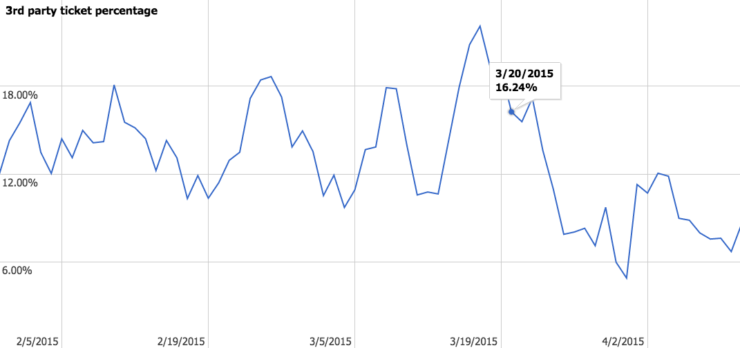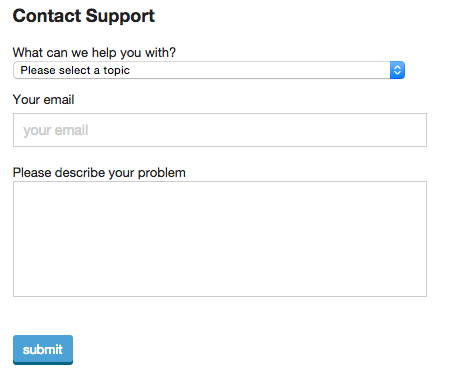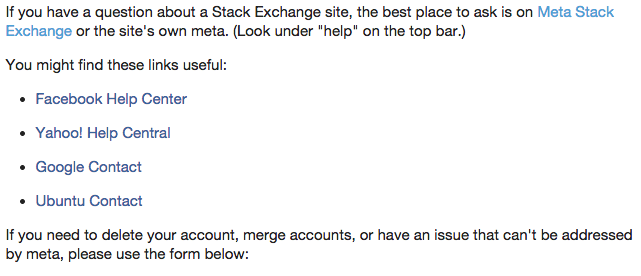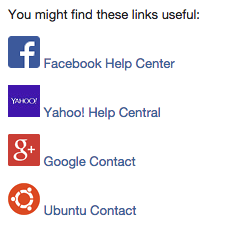Building a customer support system
Adding a honeypot
Last time I focused on social solutions to customer support problems. Today I will look at an interface solution that worked for us.
When your site contains the answers to millions of questions, as does the Stack Exchange network, and when those answers frequently turn up in Google searches, it’s inevitable that some lost souls will mistake you for the official product support system of some other company. So we get hundreds of support tickets each month that have nothing to do with our sites. It doesn’t help when we actually tried (and failed) to be the official support channel for Facebook developers.
To give you a taste of the tickets we get, here’s one I dug out of the archive:
Hello, I have been using my password for over 15 years and I am 61 years old and that is my password that I can easily remember [password redacted]. Please put my password on my account
Even if we did know what product he was talking about there’s nothing we can do to help. So we used a macro that sends this reply:
You may have contacted the wrong party. This email address provides support for the Q&A web sites at stackexchange.com, but we are not in a position to provide customer support for 3rd-party products or services. I’m sorry, but I am not familiar with their support options, so I do not have an address to forward your message. You will need to contact the correct support channels for help with your issue.
(We also warned against mailing passwords to strangers.)
Not having an account on our site is the primary calling card of a 3rd party request. Occasionally a user will lose access to their account and sometimes people create accounts thinking it will help them solve their problem with the Apple store or whatnot. In the main, however:
registered : anonymous :: our user : not our userSince June 14, 2013, when we first started collecting these statistics, here’s how many of each user type1 visited our contact form and how many actually sent a message:
user_type contact.visit contact.send
--------- ------------- ---------------
Anonymous 337,057 14,007 (4.16%)
Registered 39,872 20,245 (50.77%)So the people most likely to benefit from contacting us (our registered users) actually followed through about half the time. That’s a respectable conversion rate for this form:
These tend to be fairly motivated users who really do need our help. Meanwhile, better than 95% of anonymous users figure out they are in the wrong place. So in broad strokes, the statistics show what we’d like: our users reach us and other people’s users don’t. Unfortunately so many anonymous users visit our contact page it doesn’t take much of a conversion rate for 3rd party tickets to dominate.
In some ways, these aren’t difficult issues to solve. It only takes a moment or two to diagnose the problem and send the appropriate reply. But that process steals a little bit of mental energy that should be put to use elsewhere. Personally, I find these requests particularly draining since I’m utterly powerless to do anything to help.
My brother and I used to stay up late reading or watching TV when I
came home from college. Once in a while, he’d ask me a question and
while we were in the middle of the conversation, I’d realize he was
asleep. Answering these tickets is a bit like that. They are just
coherent enough that you gotta take them seriously. But the further you
go, the more dreamlike the interaction turns out. Your best bet is to
immediately dash their hopes let them know they might
be in the wrong place.
So on March 20 we added this notice to the top of the contact form:
It communicates that the first place to go for help is Meta or the Help Center. I purposely point people to the top bar rather than a direct link so that they have a chance to see the other items hidden there. The banner also makes clear what sort of help we provide, which isn’t so obvious from the rest of the page. Based on the types of tickets we get, I’ve added links to various help or contact pages for other products. Ideally, at least a few people will get the hint that we aren’t going to be able to help with non-Stack-Exchange problems. After running that copy for eleven days, the results were:
Anonymous 8,429 245 (2.91%)
Registered 950 500 (52.63%)So adding the blurb decreased the rate that anonymous users contacted us without discouraging registered users. For our bottom line, this should decrease our 3rd party tickets by a quarter or so. The actual decrease was about 30%.2 That’s pretty good, but we wondered if adding logos would improve our results:
After eight days of testing this version we saw further improvement:
Anonymous 6,702 169 (2.52%)
Registered 603 302 (50.08%)I’m pleased with a potential 40% decrease in tickets intended for other products, but there’s more we can do. We designed the system so that every site can have its own custom notification. Sometimes people find our Christianity and send requests like:
May I submit my prayer request to you?
We don’t get nearly as many people looking for Facebook help from that site because questions tend to the theological rather than the technological. So I added this banner in place of the list of logos:
PLEASE NOTE: despite the name, this is a secular site. We cannot answer your religious questions personally.
In the next few weeks, I plan to customize more banners starting with single-product sites such as:
I suspect these will only be incremental gains for us, but the links could become valuable for many anonymous users who stumble onto our sites. Ultimately, we are most interested in getting people the resources they need with as little fuss as possible and that includes when they try to contact us directly.
Update (April 12)
Reporting the results in terms of Zendesk tickets proved difficult initially because not all the tickets had been handled last week. Thankfully, at the end of March, we hired two Community Growth Operations Specialists who reduced our backlog from nearly a thousand tickets. So we now have enough data to show the effect in terms of people actually handling new tickets:

I used a 4-day rolling average to smooth the data. If I didn’t do that, there’d be weird spikes on days with a dozen or more third-party tickets or sudden cliffs if a day happened to get none. I also eliminated all the tickets from one of our agents who got so sick of 3rd party tickets they just archived them without responding.3 The X-axis represents the date tickets were submitted, so the drop around March 20 is directly related to the addition of the honeypot. To put it in more practical terms, the honeypot saves us from about 2 fruitless tickets a day:
Period 3rd party per day per week per year
------------ ----------------- -------- --------
Pre-honeypot 6.3 43 2288
Honeypot 4.1 29 1493
Saving (35%) 2.2 15 795I extrapolated the savings out to a year because the savings is all about scale. As I mentioned above, one context switch really isn’t that big of a deal. But saving 800 or so over the course of a year is. Real progress can be made with seemingly modest improvements.
Next time: Last fall we tackled a much bigger problem than 3rd party tickets: manual account merges and deletions.
For those who are wondering, we also have unregistered and moderator user types. Neither is significant in relative terms, so we can safely ignore those types.↩︎
Initially I was confused why the decrease was greater than what I predicted. After sort though some tickets in that date range, it occurred to me that many of the anonymous tickets are blocked as spam. Spammers are unlikely to read our contact form. And yes, we do get a lot of spam via our contact form.↩︎
It’s a tossup whether or not it’s a kinder course of action to ignore these tickets or to use our macro. It’s nearly impossible to send a reply that’s both honest and not going to rub a handful of people the wrong way. I imagine many people send these tickets with some vague hope that they will get lucky and forget about it a few minutes later. On the other hand, this did screw with our data a bit.↩︎


